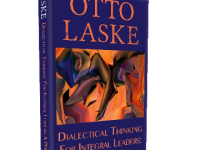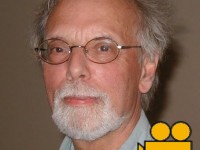It so happens that not only is the world in unceasing transformation, but the human mind (which is part of it) has been given invaluable tools to deal with it. I am referring to the “four moments of dialectic” philosopher Roy Bhaskar taught us, as well as to Basseches' and my own work on dialectical thought forms since the year 1997. In courses at the Interdevelopmental Institute, I have shown since 2000 that the four moments of dialectic equally show up in human thinking, whether manifest in speaking or writing. I daresay this could be a key for living in this rapidly changing world a little more prepared what is coming toward us. How could you make a start in dialectic? Well, as philosophers have always taught us, you need to start with yourself. It isn’t hard, but it takes an effort. Living in a language-suffused world as we do, you could start with what you hear yourself saying when you speak and consider how the four moments of dialectic inform your thinking that is being expressed through concepts. You will find that as soon as you open your mouth you have already placed yourself into one of the four... Read More...
Tag: Deep Thinking
Beyond Systems Thinking: How to Create Collaborative Intelligence
You are invited to join a webinar held on 16 November 2015 18:00 - 19:00 GMT The Speaker is Jan De Visch, a graduate of the Interdevelopmental Institute and the Managing Director of Connect and Transform, also Executive Professor Human Capital Enterpreneurial MBA, Flanders Business School (at the Catholic Univertisty of Leuven) DESCRIPTION OF THE WEBINAR The potential of circular economy projects remains unlocked in many organisations. Although many organisations have started interdisciplinary collaborations, their networks' capacities remain under-utilised. This is not due to lack of 'intelligence' of people and neither their communication skills or ability to use systems methodologies. So there are other barriers to achieve emerging collaboration and more integrative decision making for circular economy or other complex projects. This session will investigate these. Beyond Systems Thinking articulates how you can start pondering about how to think versus what to think. By focusing on classes of thought forms it becomes clear that different levels of systemic thinking exist. They can be characterized by differences in fluidity of thinking. The diversity in fluidity of thinking in teams determines whether or not they will succeed in rethinking their perspectives and come to a more holistic decision making, addressing systemic, circular... Read More...
Dialectical Thinking as a Culture Transformation Instrument for Organizations.
In this new book (to appear in 2016), addressed to CEO's, board members, and members of executive teams, Otto Laske takes an in-depth look at his Constructive Developmental Framework as a culture transformation instrument. The book focuses on organizational discourse culture as the lever by which fundamental changes come about when engaging with new forms of one-on-one and peer-listening once these are grounded in systemic dialectical thinking and an ability to "read" social-emotional meaning making in company discourse. In the tradition of consulting work based on CDF, culture transformation effects transpire in all areas of crucial important for company flourishing and breakthroughs: level of innovation, strategy design, talent management, peer-to-peer interactions in groups and teams, and the definition of new business models. The book delivers insight into the human operating system supporting holocracy. While "active listening" has been much emphasized in coaching, hosting, and DoJo4Life work, structured listening in terms of CDF is not only active but DEEP. It is deep because it is focused on joining two aspects implicit in every communication: the level of speakers' social-emotional meaning making, and the level of making cognitive sense of the world and handling its complexity. As shown in the book, both... Read More...
Buchbesprechung von Otto Laske’s “Dialectical Thinking for Integral Leaders: A Primer”
Buchbesprechung Otto Laske, Dialectical Thinking For Integral Leaders: A Primer Integral Publishers, ISBN 978-0-9904419-9-1, 2015 (June) Zusammenfassung In dieser Buchbesprechung hebt Michael Habecker die wesentlichen Gedanken eines jeden Kapitels des obigen Buches heraus und schafft dadurch eine klare Zusammenfassung der Intentionen von Otto Laske. Michael Habecker Das neue Buch von Otto Laske, als eine Zusammenfassung seiner Arbeit zum dialektischen Denken, leistet Wesentliches zur Theorie und Praxis menschlichen Denkens als eines unserer wichtigsten Instrumente und Möglichkeiten zum Erkennen und Verstehen von uns selbst, anderen Menschen und der Welt als Ganzes. Es richtet sich im Titel an „integrale“ Führungspersonen und versteht sich in diesem Sinne als ein Angebot an diesem Personenkreis und an die integrale Theorie und Praxis als Ganzes. Dieser Primer fasst die Inhalte des Buches Measuring Hidden Dimensions: The Art and Science of Fully Engaging Adults Band 2 von Otto Laske zusammen, von dem es noch keine deutschsprachige Übersetzung gibt. Übersetzt ist jedoch der Band 1, Potenziale in Menschen erkennen, wecken und messen: Handbuch der entwicklungsorientierten Beratung, in dem es um die sozial emotionale Entwicklung des Menschen geht, welche der Autor klar von der Entwicklung dialektischen Denkens, als dem Gipfel erwachsenen kognitiven Denkens unterscheidet, um die es in dem Primer... Read More...
Press Release for Otto Laske’s New Book “Dialectical Thinking for Integral Leaders: A Primer”
To appear in July 2015 at Integral Publishers Integral Publishers (integralpublishers.com) and Otto Laske, Director of the Interdevelopmental Institute (www.interdevelopmentals.org), have joined forces in order to publish a book demonstrating by examples how leaders of large forums, organizations, institutions and board of directors can quickly acquire patterns of thinking that hinder them from getting stuck in seeing the world in purely static, “logical”, terms. Leaders have long yearned for ways of excelling in focusing their thinking on processes, relationships, and patterns of transformation that reflect the complexity and incessant change that is their daily bread. Especially when working with teams, leaders have worked hard to create collaborative intelligence, by exercising ways of thinking that, while logical, transcend formal logical identity thinking by integrating “what does not fit”. Rather than wanting to fall back into orthodox systems thinking, they have craved thinking tools that are as transformational as the world in which they have to act. Leaders need to search no further. Author Otto Laske has first-hand experience with schooling thought leaders in a new way of breaking down barriers of complexity and thereby making complexity manageable. In his book Dialectical thinking for integral leaders: A primer (2015, 130 pp.) he... Read More...
How to cope with cognitive differences in circles (teams)?
This video addresses crucial issues in how to re-organize work so that individuals can deliver work in flexible role systems based on their talent. The notion put forward is that to create organizations following the model of lean and mean start ups will not do away with but will increase the requirement of deep, dialectical thinking. A few major pointers to the required structure of thinking are offered. Read More...

